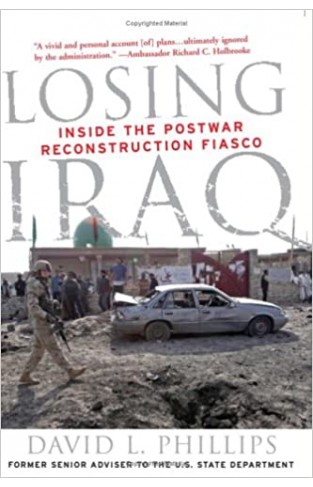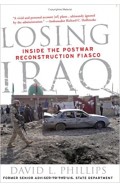Losing Iraq: Inside the Postwar Reconstruction Fiasco
By: David L. Phillips
-
Rs 2,780.00
Due to constant currency fluctuation, prices are subject to change with or without notice.
This in-depth analysis argues a new perspective on the reconstruction of Iraq The postwar rebuilding effort carried out by the United States in Iraq has been mediocre at best. Numerous books have been published criticizing the government's decision to go to war in the first place, and many have voiced concerns about the lack of planning for the postwar rebuilding process. But David L Phillips, a government insider and leading authority on foreign policy analysis, offers the first argument that there had indeed been a tremendous amount of planning for the postwar rebuilding effort that the government simply chose to ignore. Phillips reaffirms the critiques of US policy in Iraq and goes beyond those in outlining the shortsightedness and imprudence with which the US implemented its plans of restoring Iraqi sovereignty and transferring power to the Iraqis given its decision to go to war. He also documents the much-discussed fallout between the Pentagon and the State Department on managing the postwar effort.
This in-depth analysis argues a new perspective on the reconstruction of Iraq The postwar rebuilding effort carried out by the United States in Iraq has been mediocre at best. Numerous books have been published criticizing the government's decision to go to war in the first place, and many have voiced concerns about the lack of planning for the postwar rebuilding process. But David L Phillips, a government insider and leading authority on foreign policy analysis, offers the first argument that there had indeed been a tremendous amount of planning for the postwar rebuilding effort that the government simply chose to ignore. Phillips reaffirms the critiques of US policy in Iraq and goes beyond those in outlining the shortsightedness and imprudence with which the US implemented its plans of restoring Iraqi sovereignty and transferring power to the Iraqis given its decision to go to war. He also documents the much-discussed fallout between the Pentagon and the State Department on managing the postwar effort.
Losing Iraq: Inside the Postwar Reconstruction Fiasco
By: David L. Phillips
Rs 2,780.00 Ex Tax :Rs 2,780.00
Zubin Mehta: A Musical Journey (An Authorized Biography)
By: VOID - Bakhtiar K. Dadabhoy
Rs 840.00 Rs 1,050.00 Ex Tax :Rs 840.00
Manning Up: How the Rise of Women Has Turned Men into Boys
By: Kay Hymowitz
Rs 995.00 Ex Tax :Rs 995.00
No recently viewed books available at the moment.
Zubin Mehta: A Musical Journey (An Authorized Biography)
By: VOID - Bakhtiar K. Dadabhoy
Rs 840.00 Rs 1,050.00 Ex Tax :Rs 840.00
Losing Iraq: Inside the Postwar Reconstruction Fiasco
By: David L. Phillips
Rs 2,780.00 Ex Tax :Rs 2,780.00














-120x187.jpg?q6)

















